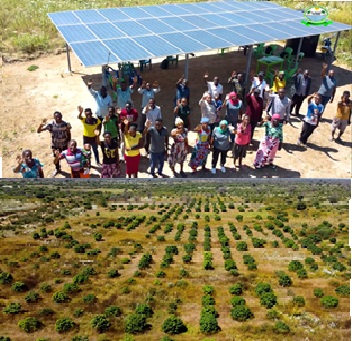Tanzania Should Use Renewable Energy Opportunities, Productively
- Category: News
- Published: Friday, 20 September 2024 13:10
- Written by Elvis
- Hits: 253

TaTEDO-SESO in collaboration with the World Resource Institute (WRI) is implementing an intervention for mapping opportunities for using renewable energy, productively in Tanzania. Access to renewable energy (both fuels and electricity) in Tanzania has improved tremendously over the last decade. The findings of the Impact of Access to Sustainable Energy Report (2021/22) show that the share of households residing in communities with access to electricity is 72 percent. According to TANESCO's recent reports, the number of households connected to electricity has increased to more than 55 percent. While electricity access is increasing, connection and consumption are still lagging. The SDG indicator 7.1.1 considers households as having access if their supply of electricity can provide light for at least 4 hours a day and at least 1 hour at night on average. These data reveal a significant development predicament because access to electricity is meaningless if households can’t afford to pay for it.
If the users do not see the opportunity to generate revenues from renewable energy, they will not have the impetus to connect to their infrastructure and sources. The use of renewable energy for only lighting, phone charging, and other domestic uses is considered to be an under-utilization of energy investment. However, some households may go months without using any electricity at all simply because it is too costly. What if in addition to directing energy at households, governments, impact investors, and development financing institutions invest in expanding energy-intensive services and boosting local incomes so that people can better afford electricity? This is the idea behind the Productive Use of Renewable Energy (PURE) concept.
The concept of productive use of renewable electricity is: "agricultural, commercial, and industrial activities involving renewable energy services as a direct input to the production of goods or provision of services". To increase income or productivity in rural contexts, PURE can be found in agriculture (e.g. irrigation, grain milling, electric fencing), manufacturing (e.g. carpentry, tailoring, welding, and looming), and the service sector (e.g. bars and restaurants using electric lights, sound systems, refrigerators, charging stations for mobile phones). Common use applications include electricity used for potable water, public lighting, education, health (e.g. refrigeration of vaccines and anti-venom), etc.
Therefore, Productive Use of Renewable Energy, or PURE, may expand access to energy in areas that help to generate more revenue for rural communities while spurring demand for clean electricity. If it is done in the right course, PURE is a virtuous cycle that not only boosts clean electricity use, but supports low-carbon economic growth, creates employment opportunities for growing youth populations, and increases income for rural communities.
Where PURE has been deployed, the results are impressive. For example, in Dodoma, WRI partnered with the TaTEDO-Sustainable Energy Services Organisation (TaTEDO-SESO) to retrofit a diesel-powered generator previously installed by the district government of Chamwino to assist mango farmers with irrigation. By the time WRI intervened, farmers had abandoned the generator due to the high cost of diesel. After retrofitting the generator with solar power and beginning irrigation again, farmers increased mango production by an average of 185% per tree — from about 35 fruits per tree to nearly 100. The project has also helped to reduce the distance farmers must travel in search of water for domestic use and livestock, while also improving their resilience and incomes by allowing them to intercrop their mangos with other high-value crops. Now they can better afford to use the clean power they have access to, as well as use more electricity if and when it's needed.
There is a high potential of using renewable energy for productive use but like the wider clean energy sector, access to finance is a major bottleneck for PURE. The cost, coupled with rural entrepreneurs’ risk aversion due to low-income levels, are major impediments. Additionally, the market for PURE solutions is still nascent; investors and financing institutions have not yet been able to identify and appreciate the full scope of opportunities, and many communities have limited capacity for running rural commercial enterprises and lack access to profitable markets.
Capitalizing on these opportunities and others like them requires changing the way policymakers, financiers, and development groups operate. Four actions could push PURE to the forefront of the electricity access expansion movement. These may include:
- Investors need to see where productive use opportunities exist.
- Unlock finance for investment in the PURE sector.
- Empower local communities to pursue existing opportunities.
- An ecosystem-based approach can help provide sustainable and scalable solutions.
TaTEDO-SESO in collaboration with WRI will explore the PURE opportunities in Tanzania and find a way of building the local capacity of people in the community, identifying the viable business and financing models that could be used to attract investments in the PURE subsector. The tool will be developed to estimate energy demands, and investment requirements for high-impact PURE opportunities. In the end, these organizations will facilitate development partners to develop business plans and invest in at least ten high-impact PURE opportunities.

